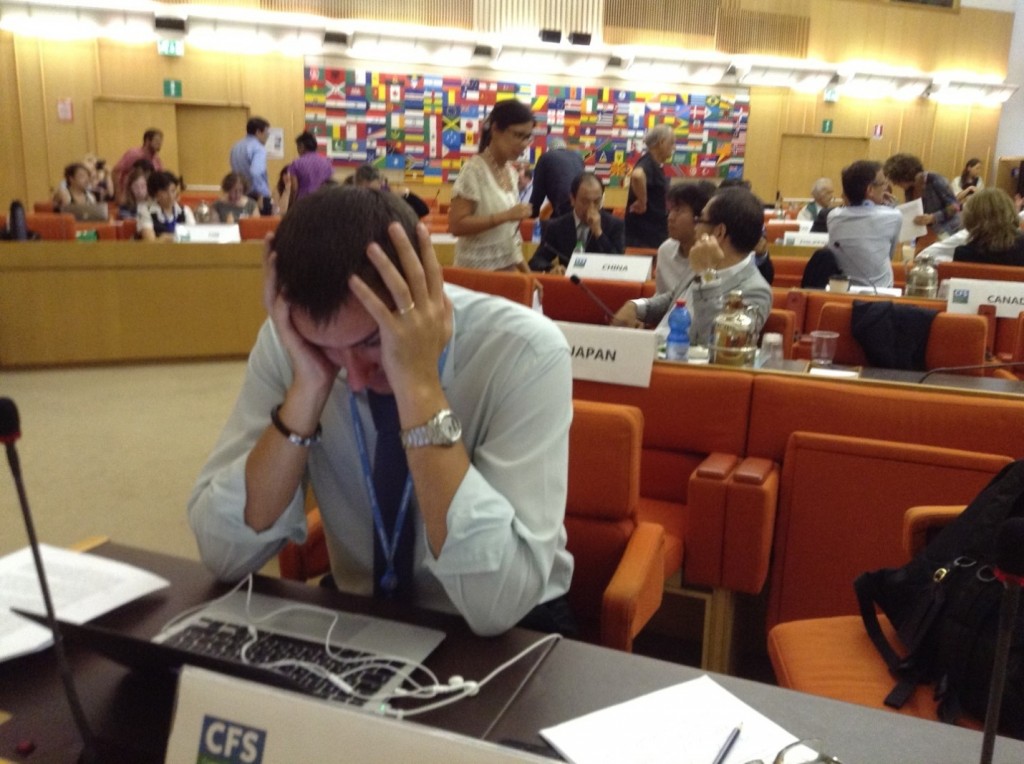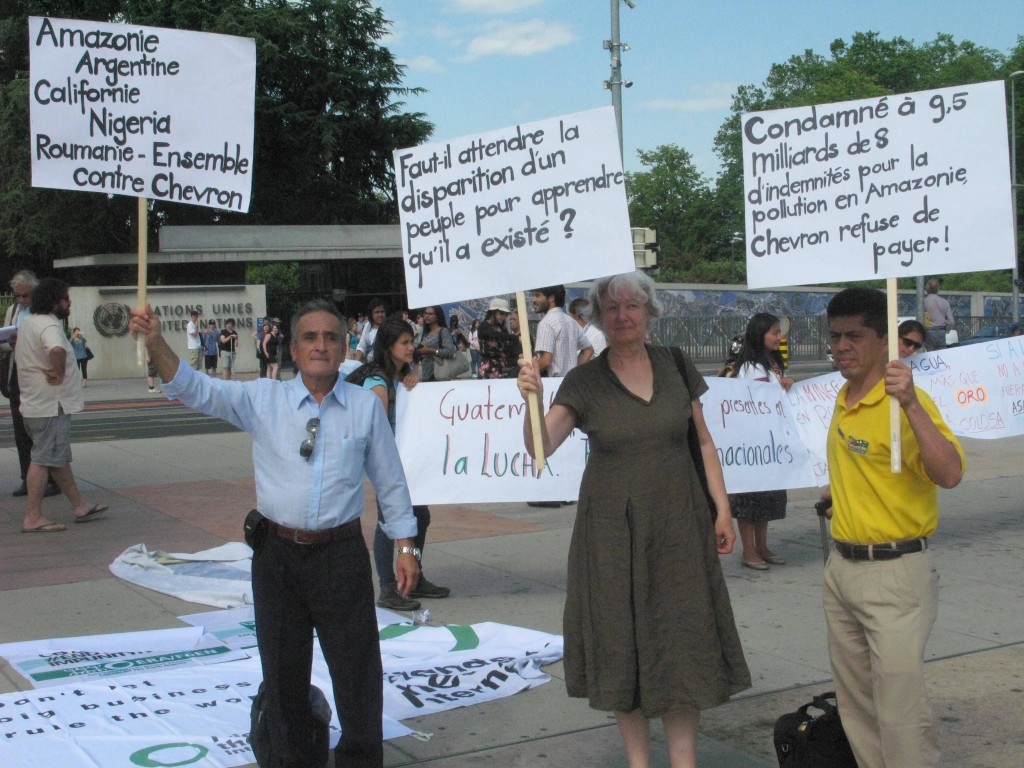The North Atlantic Treaty Organization (NATO) summit in South Wales held 4–5 September 2014 was heavily mediatized in member countries as a “wake-up call” for this military alliance, for Europe, and even for Western civilization. Violence in eastern Ukraine, for which Vladimir Putin alone was allegedly responsible, was said to be catapulting the world back to the polarization of the Cold War. Yet when one looked more closely, Putin’s propaganda was restrained in comparison with the inflammatory rhetoric of the retiring NATO secretary general and the hyperbole of the US State Department and numerous European politicians with only one thing in common: They knew little or nothing about the history of Ukraine.
Category Archives: Blog
Philip McMichael & Birgit Müller: The Land-Grab Trap: Is There a Will to Govern Global Land Grabbing?

Pause in the negotiations in the Red Room of the Food and Agriculture Organization (FAO)
How to govern the “global land rush”1 was at issue in the final negotiations on the Principles for Responsible Investment in Agriculture and Food Systems at the Committee for World Food Security (CFS) in Rome, held 4–8 August 2014. For a week, a policy drama unfolded. On stage were private sector organizations, clearly supported by the United States, Canada, and Russia, that wanted to prevent any regulation of investments. Opposing them were Civil Society Organizations (CSOs)—supported by Brazil, Ecuador, and, to some extent, Indonesia and Sudan—that wanted commitments from the governments to assume their obligations to govern investments in such a way as to realize the right to food as a national priority.
Steve Reyna: Bloat and tents: Further thoughts on Timothy Mitchell’s Carbon Democracy
This brief note suggests some directions that a rising Marxist anthropology might consider taking. Sandy Smith-Nonini and Donald Nonini have done a wonderful job explaining why Carbon Democracy is a “brilliant” book that is “essential reading for anthropologists” (2014), especially for those concerned with the political economy of fossil energy. Elsewhere, I have reviewed Timothy Mitchell’s book (Reyna 2012) and offered some suggestions concerning an approach to the anthropology of hydrocarbons (Behrends, Reyna, and Schlee 2011), so I do not propose to discuss here either the substance of Mitchell’s argument or the emerging literature on the anthropology of oil. Rather, I will explore two implications of Mitchell’s work for the very nature of the anthropological project. These implications deal with bloat (conceptual) and tents (pup and big top).
Sandy Smith-Nonini & Donald M. Nonini: Fueling the Neoliberal Turn: Why We Need to Engage Timothy Mitchell’s “Carbon Democracy”
A central, perhaps the central, question in political economy today is how forces of democracy, including organized labor and its allies, can regain a degree of control over corporate capitalism in the neoliberal era. Equally pressing (and related) is our need to confront climate change and replace fossil fuels with alternative energy resources. While the silos of academia have splintered political economy from studies of energy, the beauty of Timothy Mitchell’s Carbon Democracy lies in his eloquent and comprehensive study that merges these two essential aspects of industrial production and modern society into an integrated analysis.
Gavin Smith: Chasm: Interrupted Lives
Over the last few years I have found myself talking to people who have experienced radical displacements in their lives as a result both of economic distress and of political disturbance. They have been obliged to “move on,” to “move out,” to “move away.” Yet these are not really narratives that help put order into the world we live in. They are less to do with narrative, which is a rather literary way of believing the world can be settled for us. They’re more to do with the simultaneous solidity and the elusiveness of the role place plays in these people’s lives—even when they are not there. And they’re about the slipperiness of a time-past that sometimes deceives people that it can help deal with the present, and a time-future that keeps jumping about and producing either perpetual anxiety or, simply, resignation.
Gustavo Lins Ribeiro: IMPACTS OF THE DIGITAL ERA ON SCHOLARLY WORK
It is hard to make comments on the contemporary world without simultaneously prospecting the future. These endeavors are entangled. Under strong momentary impressions, we may believe we are facing pressing issues, but what seems so important today may quietly disappear into oblivion. At best, it is possible to scan the likelihood of various unfoldings in tune with identified trends and in analogy with previous historical examples.
Marc Edelman: Dispatch from Geneva: A Treaty on Transnational Corporations? A Declaration on Peasants’ Rights?
 An anti-TNC protest
An anti-TNC protest
The anthropology of human rights has devoted increasing attention to how diverse groups and societies interpret and implement (or not) international legal norms. The pioneering work of Sally Merry and her collaborators on how global women’s rights norms are enacted in local contexts saw this as a “vernacularization” process.1 Numerous scholars have studied the ways civil society organizations build alliances across boundaries of language, nation, ethnicity, class, and religion; construct shared imaginaries; and take rights claims to international governance venues in hopes of legislating new global norms. Few, however, have explicitly analyzed this in terms of what we might term “vernacularization in reverse.”2 To be concrete, reverse vernacularization involves the development of shared understandings and demands between, say, residents of a community in the Philippines affected by the mining giant Glencore and their counterparts near Glencore mines in Colombia, Peru, Zambia, and the Democratic Republic of Congo. Or, to take another example, small farmers in western Europe who seek to overturn prohibitions on saving and exchanging seeds and those in Brazil who face similar restrictions.